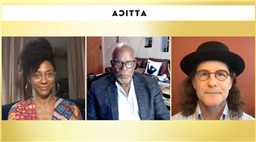Fifty years ago in September, prisoners took over the state penitentiary in Attica, NY, an event that still reverberates today.
It has endured in the collective memory not so much because of the uprising itself, but for how it ended: in an explosion of violence in which state troopers and police fired indiscriminately into the prison yard, killing more than 30 inmates and guards being held hostage.
The Showtime documentary Attica, directed by Stanley Nelson and Traci A. Curry, examines what precipitated the prison revolt, the negotiations that took place to try to end it peacefully, and the slaughter that brought it all to a close. It debuted earlier this month on the network.
“It definitely didn’t have to end that way,” Nelson said during a panel discussion for Deadline’s Contenders Film: Documentary awards-season event. “It wasn’t that all of a sudden the prisoners got more violent towards the hostages or anything like that. It was really just part of what the state wanted to do… to say that, ‘We have the power to do this and we’re tired and we’re just going to end it in the most violent way possible.’”
Related Story
Contenders Documentary: Livestream, Schedule, Lineup
Long before the uprising, Attica had gained a reputation as “the end of the road,” a place where the all-white staff of guards treated the prisoners—most of whom were people of color—like animals. Ex-prisoners told the filmmakers what the atmosphere was like.
“You hear them talk about when it was time for the prisoners to sort of move throughout the prison there was no verbal communication like, in any other circumstance, one person would give to another. It was a stick tapping the wall,” Curry said. “There was also just sort of this basic negation of humanity in terms of how the guards and the prisoners related to each other.”
Nelson Rockefeller, then New York’s Republican governor, took a hardline approach to the revolt, encouraged by President Nixon. Their discussions by phone were captured by Nixon’s White House recording system.
“None of us can look into Rockefeller’s heart and mind and know, but it seems to me based on those conversations that there never really was a good faith effort to pursue these negotiations and take seriously the things that the prisoners were asking for,” Curry said. “Because ultimately, for both Nixon and Rockefeller, this was really a question of their own political advantage that they could take out of this situation.”
Rockefeller refused pleas to visit Attica to try to defuse the situation. He hadn’t been asked to meet with prisoners—just to show up outside the prison walls.
“One of the things that the prisoners wanted was to be heard. And so Rockefeller coming would have been symbolic that the state as represented by the governor, Governor Rockefeller, the state is hearing you,” Nelson said. “I think it would have made a big difference if Rockefeller had just gone there.”
Check back Tuesday for the panel video.
Must Read Stories
‘Ghostbusters: Afterlife’ Opening Frame: We Came, We Saw, We Kicked Up $44M+
Simu Liu Vs. Bowen Yang; Peter Aykroyd Tribute; Jeanine Pirro & Donald Trump Cold Open
Outguns ‘F9’ To Become No. 1 Hollywood Title Of Covid Era Worldwide
Time’s Up Unveils “Reset” With Interim CEO To Exit & Nearly All Staff Laid Off
Read More About:
Source: Read Full Article









